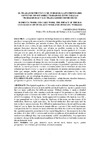Identificador persistente para citar o vincular este elemento:
https://accedacris.ulpgc.es/jspui/handle/10553/60126
| Título: | El trabajo doméstico y de cuidados: La incidencia del Convenio 189 OIT sobre trabajo decente para las trabajadoras y los trabajadores domésticos | Otros títulos: | Domestic work and care work: the impact of the ILO Convention 189 on decent work for domestic workers | Autores/as: | Grau-Pineda, Carmen | Clasificación UNESCO: | 560507 Derecho público 560504 Derecho constitucional |
Palabras clave: | Cuidados Care jobs Trabajo doméstico Trabajo decente Derechos humanos, et al. |
Fecha de publicación: | 2019 | Publicación seriada: | Documentación laboral | Resumen: | La regulación española del trabajo doméstico se debate entre la aceptación pacífica y sosegada de unos aspectos y la inacción político-legislativa frente a otros que resultan más conflictivos por razones diversas. Sin ánimo de hacer una exposición detallada de unos y otros, lo que queda fuera del objeto de esta presentación, sí que quieren destacarse algunos hitos que reflejen las posibles razones de la falta de ratificación del Convenio 189 OIT por parte de España. Recién aprobado el Convenio 189, por allá por junio de 2011, era generalizado no dudar ni de la oportunidad de la norma, ni del éxito de su ratificación. Sin embargo, ocho años después, la ansiada ratificación no llega y lo cierto es que extraña a todos. Es difícil entender como un Estado Social y Democrático de Derecho como España ha optado por quedarse de brazos cruzados y mantenerse al margen de este movimiento mundial. Y precisamente por ello las principales críticas que desde la doctrina se arrojan a la pasividad legislativa van en la línea de lo crucial que resulta en estos momentos contar con la existencia de una clara voluntad por hacer cumplir y vigilar el cumplimiento de normas internacionales como éstas que, aunque puedan parecer mínimas y superadas ampliamente hoy en día, representan un cambio sustancial en las condiciones de empleo del amplio sector que representa hoy por hoy el trabajo doméstico decente. The Spanish regulation of domestic work is debated between the peaceful and calm acceptance of some aspects and the political-legislative inaction against others that are more conflictive for different reasons. Without wishing to make a detailed statement of each other, what remains outside the scope of this presentation, they do want to highlight some milestones that reflect the possible reasons for the lack of ratification of ILO Convention 189 by Spain. Newly approved Convention 189, back in June 2011, it was generalized not to doubt either the timeliness of the norm, nor the success of its ratification. However, eight years later, the desired ratification does not come and the truth is that it misses everyone. It is difficult to understand how a Social and Democratic State of Law as Spain has chosen to remain idle and stay out of this world movement. And precisely for this reason the main criticisms that from the doctrine are thrown into the legislative passivity are in line with the crucial thing that is at this moment to have the existence of a clear will to enforce and monitor compliance of international standards such as these although they may seem minimal and far exceeded today, they represent a substantial change in the employment conditions of the broad sector that today represents decent domestic work. |
URI: | https://accedacris.ulpgc.es/handle/10553/60126 | ISSN: | 0211-8556 | Fuente: | Documentación laboral [ISSN 0211-8556], n. 116, p. 57-70 |
| Colección: | Artículos |
Visitas 5
491
actualizado el 15-ene-2026
Descargas
347
actualizado el 15-ene-2026
Google ScholarTM
Verifica
Comparte
Exporta metadatos
Los elementos en ULPGC accedaCRIS están protegidos por derechos de autor con todos los derechos reservados, a menos que se indique lo contrario.
